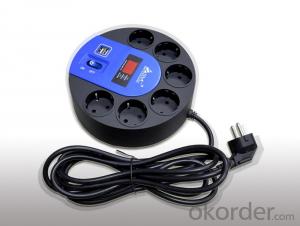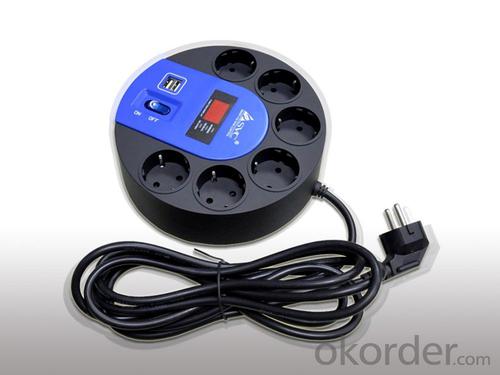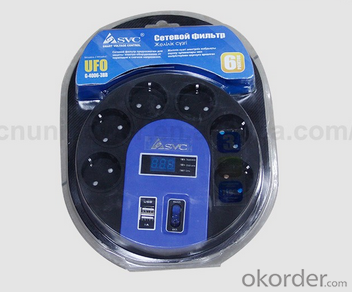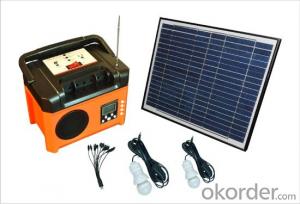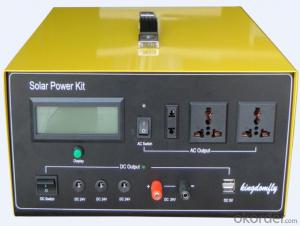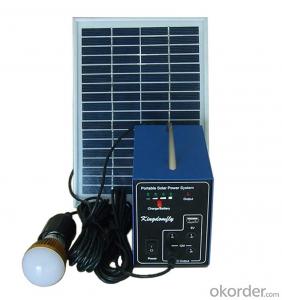Solar Energy Systems Factories - Euro Industrial Multi LED Display USB Universal Electric Socket
- Loading Port:
- China main port
- Payment Terms:
- TT OR LC
- Min Order Qty:
- 20 carton
- Supply Capability:
- 10000 carton/month
OKorder Service Pledge
Quality Product, Order Online Tracking, Timely Delivery
OKorder Financial Service
Credit Rating, Credit Services, Credit Purchasing
You Might Also Like
Euro Industrial Multi Led Display USB Universal Electric Socket
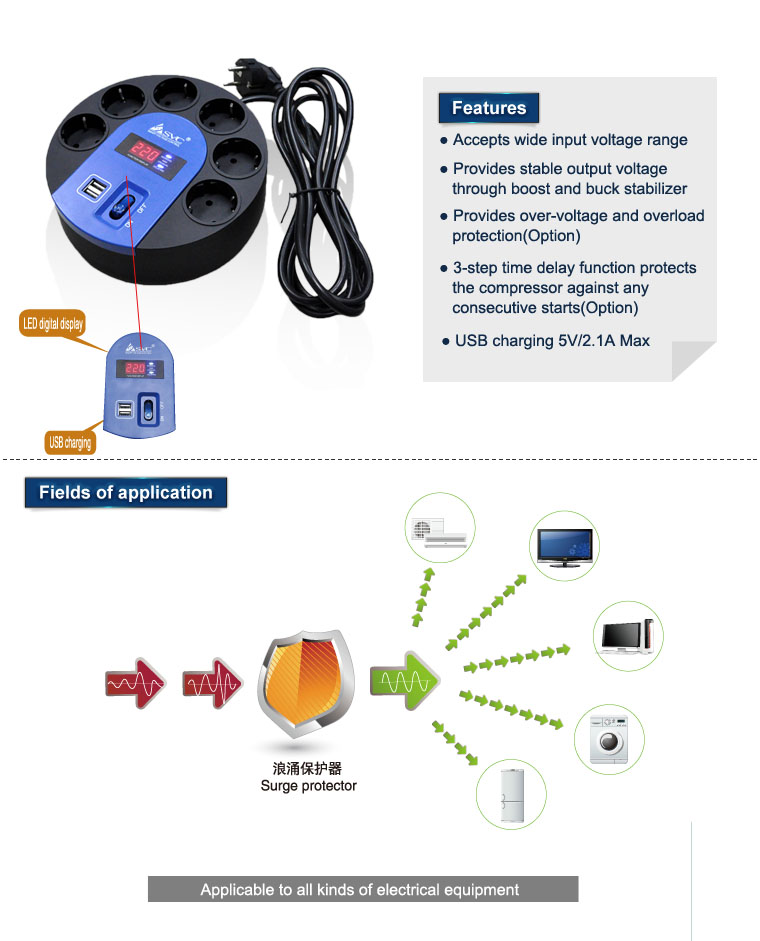

1. Wide range of input voltage
2. Provides stable output voltage and overload protection(Optional)
3. Provides over-voltage and overload protection(Optional)
4. 3-steps time delay function protects the comptessor against any consecutive starts (Optional)
5. USB charging 5V/2.1A max

| Model | G-2006 | G-4006 |
| Voltage range | 180-245Vac | |
| Current | 10A | |
| Insulation voltage-withstand | 1500 / 1min 2000V 3sec | |
| Insulation resistance | ≥100 | |
| Power cord | Cross-sectional area:3*0.75 | |
| Operating life | 10000 times | |
| Net weight (kg) | 0.55 | |
| Environment | Temperature 0℃~40℃ | |
- Q: Can solar energy systems be used for heating and cooling?
- Yes, solar energy systems can be used for heating and cooling. Solar thermal systems can capture and harness the sun's heat to provide hot water or space heating, while solar-powered air conditioning systems use solar energy to cool indoor spaces.
- Q: Are there any tax credits available for installing solar energy systems?
- Yes, there are tax credits available for installing solar energy systems. The federal government offers a solar Investment Tax Credit (ITC), which allows homeowners and businesses to deduct a percentage of the cost of their solar system from their taxes. Additionally, some states and local governments also provide their own incentives and tax credits for solar installations. It is recommended to consult with a tax professional or visit official government websites to determine the specific tax credits available in your area.
- Q: Are there any risks of electrical surges or voltage fluctuations with solar energy systems?
- Solar energy systems come with potential risks of electrical surges or voltage fluctuations. Although the solar panels themselves do not cause these issues, integrating the systems with the existing electrical grid can present challenges. One risk arises from sudden changes in sunlight intensity, which can lead to voltage fluctuations. For instance, when a cloud passes over a solar panel, the abrupt decrease in sunlight can result in a drop in voltage output. Conversely, when the cloud passes, the sudden increase in sunlight can cause a surge in voltage output. These fluctuations have the potential to impact the stability of the electrical grid. Another risk is associated with the inverters utilized in solar energy systems. Inverters convert the direct current (DC) produced by solar panels into alternating current (AC), which is compatible with the electrical grid. Inverter failure or malfunction can cause voltage fluctuations or surges, potentially damaging electrical equipment or disrupting the electrical supply. To address these risks, solar energy systems typically include protective devices such as surge protectors and voltage stabilizers. Surge protectors divert excess energy away from the system to prevent voltage spikes, while voltage stabilizers regulate voltage levels to ensure a steady and safe supply of electricity. Furthermore, proper installation and regular maintenance of solar energy systems are crucial in minimizing the risks of electrical surges or voltage fluctuations. Qualified professionals should handle the installation process, ensuring correct connections and grounding of all components. Routine inspections and maintenance checks can help identify and resolve any issues before they escalate into serious problems. In conclusion, while solar energy systems offer many benefits, it is important to acknowledge and address the potential risks associated with electrical surges or voltage fluctuations. By implementing suitable protective devices, following proper installation and maintenance procedures, and collaborating with qualified professionals, these risks can be effectively managed, guaranteeing the safe and reliable operation of solar energy systems.
- Q: How does the angle of incidence affect the performance of solar panels?
- The angle of incidence greatly affects the performance of solar panels. Ideally, solar panels should be positioned perpendicular to the sun's rays to maximize energy absorption. When the angle of incidence deviates from this optimal position, the amount of sunlight reaching the panels decreases, resulting in reduced energy production. Therefore, it is crucial to adjust the angle of solar panels according to the sun's position throughout the day to optimize their performance.
- Q: Can solar energy systems generate power at night?
- No, solar energy systems cannot generate power at night because they rely on sunlight to produce electricity.
- Q: Can solar energy systems be used for powering electric bike charging stations?
- Indeed, electric bike charging stations can be powered by solar energy systems. The installation of solar panels on the roofs or in close proximity to the charging stations allows for the absorption of sunlight and its conversion into electricity. Consequently, this renewable energy source can be harnessed to charge the batteries of electric bikes. Through the employment of solar power, electric bike charging stations can function autonomously, minimizing dependence on fossil fuels and lessening carbon emissions. Moreover, solar energy systems present an economical and environmentally-friendly option for powering electric bike charging infrastructure.
- Q: Can solar energy systems be used for electric vehicle charging stations?
- Yes, solar energy systems can be used for electric vehicle charging stations. Solar panels can generate electricity that can be used to charge electric vehicles, making them a sustainable and environmentally-friendly option for powering EV charging stations.
- Q: Can solar energy systems be used in areas with high levels of bird activity?
- Solar energy systems can indeed be used in areas where there are many birds. However, it is crucial to take precautions in order to ensure the safety of the birds and the optimal performance of the solar panels. A common concern is the possibility of birds colliding with the panels. To address this, manufacturers often include bird deterrents such as mesh screens or reflective coatings on the panels, which make them more visible to birds and decrease the risk of collisions. Additionally, proper installation and maintenance of the solar energy systems can minimize potential nesting or roosting sites for birds, thus reducing the likelihood of damage to the panels. By addressing these considerations, it is possible to effectively utilize solar energy systems in areas with high bird activity while still protecting the local bird population.
- Q: What are the different system monitoring options for solar energy systems?
- Solar energy systems offer a range of monitoring options that provide real-time data and insights into system performance and efficiency. These options enable users to track energy production, detect issues or malfunctions, and optimize overall system performance. 1. Inverter Monitoring: Most solar energy systems include an inverter, which converts DC power from solar panels into AC power. Monitoring the inverter allows users to track its output and performance, including voltage, current, and power output. This helps identify issues and ensures maximum efficiency. 2. Energy Monitoring: Real-time data on energy production and consumption can be obtained through energy monitoring systems. These systems measure the energy generated by the solar panels and the energy consumed by the household or business. Monitoring energy consumption patterns allows users to adjust usage for maximum benefits. 3. Remote Monitoring: With remote monitoring options, users can access and monitor solar energy systems from anywhere using a computer or smartphone. These options typically include web-based interfaces or mobile apps that provide real-time data, alerts, and system performance tracking. Remote monitoring offers convenience and accessibility even when users are away. 4. Data Logging: Data logging systems collect and store historical data on system performance and energy production. These systems track parameters such as energy production, temperature, voltage, and current. Analyzing this data helps identify trends, patterns, and anomalies, informing decisions for system optimization and maintenance. 5. Fault Detection and Diagnostics: Advanced monitoring systems can detect malfunctions or issues with solar energy systems, such as faulty panels, wiring problems, or communication errors. Fault detection and diagnostics capabilities enable prompt actions to rectify these faults, ensuring optimal performance and longevity. In summary, the various monitoring options for solar energy systems provide valuable insights and information for maximizing performance, efficiency, and longevity. Real-time data, remote accessibility, and fault detection capabilities empower users to make informed decisions and proactively optimize energy production and cost savings.
- Q: Can solar energy systems be used in disaster-stricken areas for emergency power supply?
- Yes, solar energy systems can be used in disaster-stricken areas for emergency power supply. Solar panels can generate electricity even in remote locations without access to the grid. They are a reliable and sustainable source of power that can be set up quickly to provide energy for essential services such as hospitals, communication systems, and emergency relief efforts. Solar power can help bring stability to disaster-stricken areas by providing a consistent and renewable source of electricity when traditional power infrastructure may be disrupted or unavailable.
Send your message to us
Solar Energy Systems Factories - Euro Industrial Multi LED Display USB Universal Electric Socket
- Loading Port:
- China main port
- Payment Terms:
- TT OR LC
- Min Order Qty:
- 20 carton
- Supply Capability:
- 10000 carton/month
OKorder Service Pledge
Quality Product, Order Online Tracking, Timely Delivery
OKorder Financial Service
Credit Rating, Credit Services, Credit Purchasing
Similar products
Hot products
Hot Searches
Related keywords
